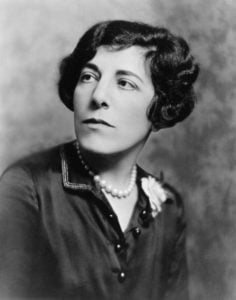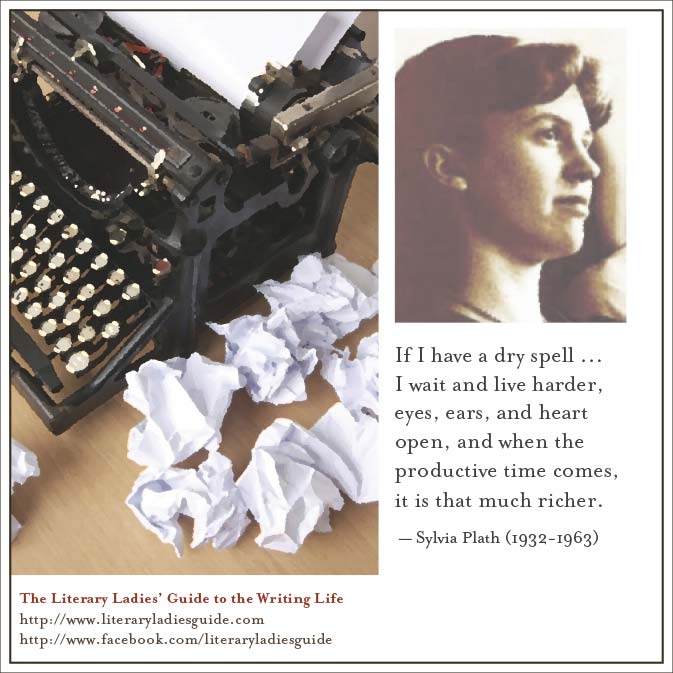Classic Women Authors Tackle Writer’s Block
By Nava Atlas | On January 7, 2017 | Updated December 27, 2019 | Comments (1)

Writer’s block is a subject that writers try to avoid thinking about, let alone experiencing. Conventional wisdom on what to do when one hits that proverbial wall is about as much fun as the malady.
For example, “try thinking of writing as a job,” or “set deadlines and keep them” are two common ideas for unblocking. The first one is about as inspiring as doing laundry (especially for writers who already have a job); and if you could set and keep deadlines, then you wouldn’t be blocked in the first place, would you?
Learning how to deal with writer’s block is a critical component of the writer’s toolbox, though, so here’s a brief survey of what the women whose shoulders we stand on have had to say on the subject of writer’s block.
. . . . . . . . . . . .
Don’t try to write better than you can

See also: Edna Ferber’s Quotes on Writing and Living
Edna Ferber blamed writer’s block on “trying to write better than you can” — referring to the self-consciousness that causes you to seize up and shut down. Anna Quindlen echoed this sentiment in her well-known quote, “People have writer’s block not because they can’t write, but because they despair of writing eloquently.”
The answer to this is to be where you are with your writing, and not try to write as the Pulitzer Prize-winning fantasy version of yourself. There’s no way to reach soaring heights without taking all the tiny steps to get there. And besides, if you keep your eye on the destination and ignore the journey, you may never get anywhere at all.
. . . . . . . . . . . .
Let the well fill up if it has run dry

See also: How can one persevere when writing pays so poorly?
Sylvia Plath recognized the need for refueling, writing in a letter, “If I have a dry spell … I wait and live harder, eyes, ears, and heart open, and when the productive time comes, it is that much richer.”
Indeed, another cause of block is that the proverbial well has run dry. This usually occurs after an intense outpouring of creative effort. Suddenly, there’s nothing left, not a drop to squeeze from your previously productive mind.
The solution to this depletion, wisely recommended by creativity coaches like Julia Cameron and others, is to pause and let the well fill up again, indulging in outings, adventures, social and cultural experiences, and other inspiring (or restful) pleasures.
. . . . . . . . . . . .
Eliminate unnecessary distractions

George Sand: On the Agony and the Ecstasy of Writing
Many writers of the past produced a copious literary output, and were also vigorous letter-writers (Virginia Woolf and George Sand come immediately to mind). Few people write long letters any more, so detailed, effusive e-mails or blog posts might stand in for epistolary writing practice.
Procrastination, self-sabotage, and unnecessary distractions aren’t necessarily causes of block, but contribute to feelings of helplessness in mitigating it. Often, the root can be ambiguous, so finding a specific remedy is tricky.
As with physical health, one of the ways many writers have dealt with block is prevention. Just as you keep your body limber with exercise, you can keep your writer’s mind agile simply by continuing to write, whatever form it might take, most every day.
. . . . . . . . . . . .
Use journal-keeping to unload your thoughts
See also L.M. Montgomery: Writing Without Time or Privacy
For L.M. Montgomery, her journal was a trusted friend that served all these purposes. She struggled with depression even as she created the most sunny, positive characters (most famously, Anne Shirley of Anne of Green Gables) to keep her readers happy. She kept copious journals into which she poured her woes.
Madeleine L’Engle also touted journal-keeping for similar ends: “A journal is a place where you can unload, dump, let go. It is, among other practical things, a safety valve … And it’s where I jot down ideas for stories, descriptions of a face seen on a subway, a sunset seen over the Hudson, or our Litchfield Hills.”
In the classic guide If You Want to Write (1938), Brenda Ueland posits that blocks come from focusing too much on the big picture, so that “when you plan such a huge edifice of words, your heart fails you.” She urged all writers to “keep a slovenly, headlong, impulsive, honest diary,” as a way to “discover that the ideas in you are an inexhaustible fountain.”
Keeping a diary or journal (I use the terms synonymously here), though not a revolutionary idea, has long been a favorite tool to keep words flowing, whether in service of recording daily events, capturing ideas, or venting.
. . . . . . . . . . . .
Make writing part of your daily life

Maya Angelou wrote, “I make writing as much a part of my life as I do eating or listening to music.” So it’s not surprising that she has also recommended writing regularly, even if you’re blocked or simply uninspired, and even if it begins as twaddle: “I may write for two weeks ‘the cat sat on the mat, that is that, not a rat.’
And it might be just the most boring and awful stuff … And then it’s as if the muse is convinced that I’m serious and says, ‘Okay. Okay. I’ll come.’”
. . . . . . . . . . .
— Excerpted and adapted from The Literary Ladies’ Guide to the Writing Life by Nava Atlas
- Find more writing advice from classic women authors
- More remedies for writer’s block: Lower Your Standards to Write Better

Oh! my God! Writers block? Trying to write beyond your best so there is nothing there, easy, I’m a Virgo, we’re perfectionists, it fits the bill, instead of writing the best you can without attaining the impossible. It’s a matter of letting go and allowing the juices to flow, it appears to work.